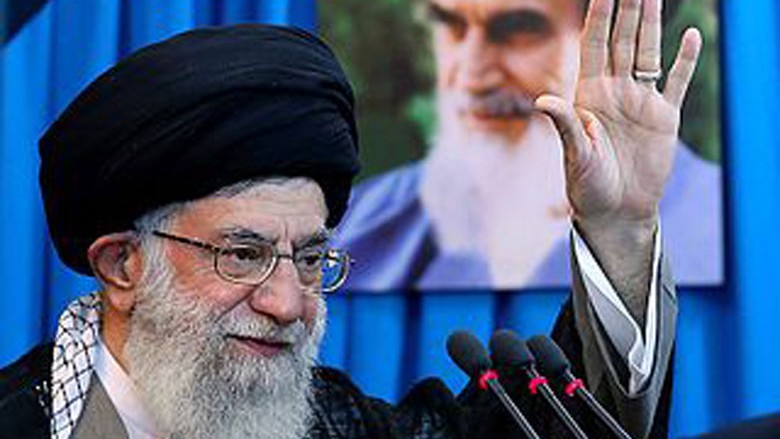Iran’s Ayatollah says US works against ‘religious democracy’
By CNS News | February 18, 2016, 16:54 EST
 (Courtesy of Wikimedia)
(Courtesy of Wikimedia) (CNSNews.com) – Iranian supreme leader Ayatollah Ali Khamenei accused America Wednesday of questioning the legitimacy of Iran’s upcoming elections, in a bid “to deprive Muslim nations in the world of the unique, novel and attractive phenomenon of religious democracy.”
He also accused the U.S. of behaving in an untrustworthy manner when it comes to sanctions relief under the nuclear deal, and said Americans should not be surprised that Iranians chant the slogan, “Death to America.”
“When you act in this way and your past and present are indicative of your overt enmity, which response do you expect from the Iranian nation?” he asked.
Addressing a large delegation of Iranians from East Azerbaijan province, Khamenei said the U.S. and other foreign enemies were trying to undermine Iran’s Feb. 26 elections by “defaming” state institutions, in particular the Guardian Council.
A report on the speech posted on the website of the Office of the Supreme Leader said Khamenei had stressed, in a reference to the U.S., “that one of the objectives of the Global Arrogance in questioning the elections is to deprive Muslim nations in the world of the unique, novel and attractive phenomenon of religious democracy.”
He urged citizens to respond to this “premeditated conspiracy” by turning out in force on election day.
“Through their massive and informed presence, endowed with insight and awareness, in the elections, people [must] act exactly contrary to the enemy’s expectation,” he said.
Iran next Friday holds an election for the 290-seat parliament (majlis) and for the 88-member Assembly of Experts, a body of religious scholars whose tasks include appointing the supreme leader.
The last Assembly of Experts election was held 10 years ago. Given Khamenei’s age (76) and frail health, the body elected next week could well be responsible for appointing his successor. As such, its ideological makeup will be significant.
But the Guardian Council, a small legal-religious body appointed by the supreme leader, is empowered to rule on all candidacies. It disqualified around four-fifths of the Assembly of Experts candidates, including prominent “reformists,” approving just 165 out of more than 800 aspirants. Not one is a woman.
Similarly, the Guardian Council disqualified almost half of the candidates for parliament – again including most of those viewed as reformists – approving only some 6,300 out of more than 12,100 hopefuls.
The Guardian Council’s role in safeguarding the religious establishment draws critical scrutiny every election cycle, and in his speech Wednesday Khamenei attacked that criticism.
“Since the very beginning of the Islamic Revolution, foreigners have been working out schemes to prevent the holding of general elections in Iran,” he said.
“Since they were disappointed, they have been in recent years concentrating on calling into question the elections and they intend to exercise influence in the elections.”
Khamenei said the “sly scheme” began with “defaming the Guardian Council and questioning its decisions,” with the aim of challenging the legality of the election outcome, and thus the legitimacy of the elected institutions’ actions in the years ahead.
He then went on to highlight the importance of the Assembly of Experts, noting that it would appoint his successor and that its members should therefore be “loyal” to the Islamic Revolution.
“The significance of the position of the Assembly of Experts is due to the fact that it is the country’s main decision-maker and policymaker with regard to appointing the leader. Therefore, electing members of this assembly is a very important issue.”
“If the Assembly of Experts’ members are loyal to the revolution, wholeheartedly devoted to the nation, aware of enemy plots and steadfast against these plots, their decision-making, when the time comes, will be one way,” he said. “But if the [Assembly of] Experts members are any different from this, they will act in a different way as well.”
The National Council of Resistance of Iran (NCRI), an exiled opposition movement which Tehran views as a terrorist group, says the nature of elections in Iran is very different to that in a democracy.
“Elections in Iran are not decided by the free will of the people because those who are nominated as candidates only represent a very small fraction of the Iranian population; i.e., IRGC [Islamic Revolutionary Guard Corps] members and others who have a vested interest in the regime and are entirely loyal to the absolute rule of the supreme leader,” it said in a recent analysis.
“Therefore, the elections are decided by the internal balance of power between long-established factions and by certain considerations deemed necessary for the survival of the system,” NCRI said. “The prime objective of all factions is to maintain the status quo of the clerical regime.”
— Written by Patrick Goodenough










